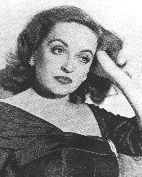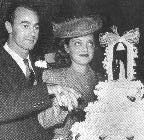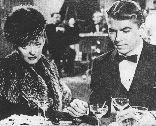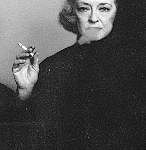
"I abhor cheap sentiment"
IT'S ONLY WORDS
And words are all we have...
Platitude: attitude
The words we use shape how we think.
Smarm meets the Bullshit Detector
Even what we are free to think.
-
"Successful ideologies are often thought to render their beliefs natural and self-evident -- to identify them with the 'common sense' of a society so that nobody could imagine how they might ever be different. ...a ruling ideology does not so much combat alternative ideas as thrust them beyond the very bounds of the thinkable."
Terry Eagleton: Ideology: An Introduction, 1991
Hey! What's a Hollywood diva doing, tucked next to a theorist of ideology, in a debate cast as solemn cogitation on "the rights of lesbians and gay men"? Lately such a sober lot on the "rights" front, even the guys -- way past "camp" (or are they?), dragged up as Virtually Normal. Well, as Susan Sontag said in "Notes on Camp," 1966:
-
"Camp is a solvent of morality.
It neutralizes moral indignation, sponsors playfulness."
And god (maybe even God) knows: We need some solvent now. Not of morality. The ways we treat each other can truly be wrong or right: unjust or fair; selfish or giving; brutal or humane. But of "moral indignation" -- yes. It's a mask, real morality rarely behind it. Camp grew from keen awareness of masks: putting them on, taking them off -- and prying behind them. With wit, play, and acid parody.
Some radical gay lib types, and later proponents of "respectable" rights -- so different in their take on our lives -- share a certain disdain for "camping it up." To sober '70s lefties, camp was rooted in oppression: it was compensatory, frivolous, a vehicle not fit to carry us to liberation. And it was seen as a "downtown fag" thing (dykes don't wanna have fun?). To stern modern mavens it's an embarrassing stereotype. Even as they typecast all of us for sale as a "gay market" genetically programmed for "shop 'til you drop."
But camp went beyond "camping it up." It was a culture, a way of seeing: observant, perceptive, wickedly incisive. It was often brave, quite often funny. I said of that culture in a memoir:
-
"It was replete with -- in fact rooted in -- a sense of irony, a certain detachment, a view of the world from a place oddly if usefully positioned: on the margins. It was only because we lived to one side of 'the normal' that we could see so well how the supposedly normal world works. We stood outside, sometimes painfully, but we stood unblinkered.
"We could see."
That perspective -- "oblique" Neil Bartlett called it, "because of that informed, revealing, powerful" -- we might have shared with Radical Faerie Harry Hay, French philosopher Michel Foucault, fringe filmmaker Derek Jarman, New York poet Frank O'Hara. Or with the local tomboy or the high-school nerd or a hard-working streetwise kid.
With them we also share a rare and precious device, one of the mind, first tagged in the skeptical Sixties if maybe invented by Socrates: the Bullshit Detector.
On our long march to Virtually Normal, too many of us have left that sensible device behind. Some have even gone into the Bullshit Business (Nuptial Branch), happy to wallow in "moral" indignation. Some, I trust, deploy its glittering generalities in blithe good faith; of a few I suspect knowing fraud.
In any case, let's set our Detectors on de-stun. As Bette said in All About Eve more than 50 years ago (in addition to "I abhor cheap sentiment"): "Fasten you seatbelts. It's going to be a bumpy night!"
"Equality"

"How dare you treat me
like a chorus girl!"
To equal-girl-opportunity
employer Jack Warner
Equality beyond sameness
The Canadian Charter of
Right and Freedoms
The Charter's Section 15 (Equality Rights) has two parts:
"(1) Every individual is equal before and under the law and has the right to the equal protection and equal benefit of the law without discrimination and, in particular, without discrimination based on race, national or ethnic origin, colour, religion, sex, age or mental or physical disability.
"(2) Subsection (1) does not preclude any law, program or activity that has as its object the amelioration of conditions of disadvantaged individuals or groups, including those that are disadvantaged because of race, national or ethnic origin, colour, religion, sex, age or mental or physical disability."
Anti-gay bias is not specifically barred, "sexual orientation" not among the Charter's "enumerated grounds." But two other words there have had sweeping effect:
"in particular" -- meaning the list was not exclusive: other ground could be "read in." The Supreme Court of Canada read in "sexual orientation" in 1995 -- making bias based on it unconstitutional.
Subsection 2 is meant to allow discrimination in favour of people or groups "disadvantaged." The Charter was written to recognize that formally "equal" treatment can make some of us less than equal.
Equality as sameness
-
"The law in its majestic equality forbids the rich as well as the poor to sleep under bridges, to beg in the streets, and to steal bread."
Anatole France, in Le Lys Rouge, 1894
(with thanks to Craig Patterson for the reference)
Equality, too many insist, means treating all of us in exactly the same way. As if all of us live the same life. Or some average, "normal" life. (And guess who gets to define "normal"? Not just in terms of sexual orientation, but culture and class.) We do not, any more than the rich and poor did 1894.
Canadian laws (if not American, nor too many Canadians steeped in American rhetoric) clearly recognize the difference between US-style formal "equality" and a deeper sort, called "substantive": equality not just in name, but in effect. (Get set for some Canadian constitutional history -- more interesting than you might suspect.)
In a 1994 essay called "Why treating people the same doesn't make them equal," David Vickers, now a justice of the Supreme Court of British Columbia, wrote:
- "Similar treatment often generates very, very different results. The impact of some laws will vary depending upon a person's economic or social or cultural reality. ... The first lesson of equality is to understand that equality means accommodating differences. The fundamental notion of equality in this country is to address differences."
All human rights laws exist precisely to defend difference -- not to make us the same. For the last 20 years those laws have been based on the Charter of Rights, enshrined in the Constitution signed by the Queen and Pierre Trudeau on April 17, 1982. Section 15, its equality provisions (quoted at the left), came into force three years later.
That section has two parts. The first bans discrimination based on various grounds. The second allows discrimination -- of a positive kind: aimed at "amelioration of conditions of disadvantaged individuals or groups." It sets a clearly Canadian distinction: simplistic "equality" -- treating all of us as if we were the same -- is not the same as substantive justice: treating us with respect for our very different realities.
Section 15 says whose rights are protected. The Charter's first section says what those rights are. It too strikes a note distinctly Canadian: Rights are not absolute.
-
Guarantee of Rights and Freedoms
1. The Canadian Charter of Rights and Freedoms guarantees the rights and freedoms set out in it subject only to such reasonable limits prescribed by law as can be demonstrably justified in a free and democratic society.
Fundamental Freedoms
2. Everyone has the following fundamental freedoms: (a) freedom of conscience and religion; (b) freedom of thought, belief, opinion and expression, including freedom of the press and other media of communication; (c) freedom of peaceful assembly; and (d) freedom of association.
So: We have freedoms -- within limits. Those limits must be "reasonable." They must be "demonstrably justifiable," which -- in a country dedicated to "peace, order, and good government," not "life, liberty and the pursuit of happiness" -- may not be all that hard to demonstrate. Courts can say discrimination is, in some cases, justifiable; politicians in a panic at potential disorder (or maybe defeat at the polls) can pass laws "notwithstanding the Charter of Rights."
Some, contrasting Canada to the Sweet Land of (formally absolute) Liberty, find this sadly deferential. Others see it as subtle acknowledgment of social fact: We share a civil society. Governments cannot grant "happiness." At best they can preserve enough peace to let us pursue happiness, however we may define it, for ourselves.
And, better, for each other -- without anyone getting trampled in a mad rush to vaunted, absolute, individual (and often illusory) "liberty."
Our greatest legal victory for erotic difference grew from just such subtle distinctions. In 1995 the case of James Egan and Jack Nesbit reached the Supreme Court of Canada. Together for more than 40 years, Jim hoped Jack would qualify for survivor benefits under the Old Age Security Act -- benefits solely for opposite-sex survivors. They claimed discrimination based on sexual orientation.
The court agreed, but said it was justifiable discrimination: the Act's intent when passed had been to provide for women likely in more need than men: indigent widows of war vets. But they also said that such bias was not justified more generally. In a unanimous decision "sexual orientation" was "read into" Section 15 of the Charter, making it not just subject to challenge under human rights laws in most provinces but -- for all of Canada -- unconstitutional.
That ruling was a defeat for mere equality. For freedom it was a stunning triumph.
Refusal to make such distinctions led to a different sort of Supreme Court ruling in the 1999 case of M v H, a lesbian couple otherwise anonymous who had split up, one suing the other for support. M (or was it H?) claimed that Ontario's Family Law Act's common-law definition of "spouse," limited to "man & [effective] wife," was discriminatory.
One judge disagreed. His written ruling took a close look at family law, historically meant to ensure a right to support -- from absconding men, for abandoned women and children. Two women splitting up shouldn't have automatic claim to that right: people of the same sex (in fact, even of the opposite) can have relationships that are different; not all fit the model of financial dependence.
The other eight justices didn't buy it, dismissing such distinctions as sadly illiberal. They opted for "equality." Or for its avid advocate: M and H has already settled out of court; their lawyer insisted they push on anyway -- to set a precedent. For all of us.
Brenda Cossman, taking a close look at this "lesbian alimony" decision, said it should please governments dying to download "dependent" costs onto "spouses," fitting their deeper agenda: privatization of social welfare. "Some of us," she wrote," have won the right to sue our exes. And a bunch of us have won the right to be sued and make the big pay out. And pay we will."
Bowing to the Court the next year, Parliament passed the "Modernization of Benefits and Obligations Act," changing the definition of "spouse" from "man and woman" to "any two persons" in all laws -- except marriage law. Common-law couples of the same sex joined the million or so already bound in Thoroughly Modern Mandatory Matrimony.
That got called a victory. (Except, of course, by those whining that they had "won" everything but a word: marriage.) Watch out what you ask for. You might get it.
Breaking into jail?
Openly gay MPP Svend Robinson has said society has nothing to fear from gay nuptiality: "It will reinforce the institution of marriage." Precisely. See:
Welcome to our world!
Now here's the rule book.
The Real World blesses homosexual matrimony -- in the name of "social stability"
Gay people, having fought to win laws making space for difference, are now seen hiving to the norm in the name of equality. As sameness: We're just like you! We're nice! You should like us! And not a few nice liberals do -- welcoming nice homos into the "stable" and otherwise unrenovated (if maybe redecorated) house of social order.
Pioneering queer activist Harry Hay once said that gay people are just like heterosexuals -- in one place. And only one place: in bed. Sex is sex (think about it: anything you can do they can do too; kink is not solely "gay"). It's our lives beyond sex that make us distinctive. Some of us may want to be safely "the same." Some work hard to keep up appearances. They are free -- they even have a right -- to give it a try.
But they have no right -- even in the name of Rights -- to impose sameness on the rest of us. Or to lie about who we might be or how we live in order to "win respect" for their sameness. (Normal don't get no respect??)
Equality as sameness is not just bad pop jurisprudence. It is denigration of difference. It exposes a willingness to leave others not safely "same," by choice or by chance, out in the cold. Seems some judges are more humane that many "gay rights" activists.
As another activist asked years ago: "Will no one put the 'quality' back in Equality?"
"Dignity"

"I don't recall ever
being laid by your father.
You had to be an
immaculate conception."
To her daughter Barbara
on Dad, wed to Bette in 1945
My dignity (to hell with yours!)
Equality as a legal concept is, as we've seen, complex. "Dignity" in law is merely ambiguous. My dictionary says its Latin root means "worthy"; its definitions deal mostly with status: ennobling rank bestowed by authority. "Dignify" may even mean "to give a high-sounding name: to dignify lust."
No definition on offer there connotes a more popular take on the term: "self-esteem." "Dignity" may appear in some laws, surely in some court rulings on human rights law. But some wonder if it has any place in law at all.
The state cannot grant you dignity (but maybe as a "dignitary"). Any more than it can make you happy. The best the state can do is create an environment in which your self- esteem might grow: one where our governments, and each other, respect each person's unique and autonomous body, mind and spirit; each person's freedom of action, thought, and desire; each one's beliefs, personal connections, and communal commitments.
In short: an environment in which each of us is regarded as a citizen. And regards other people as citizens. You don't have to love them or even like them. Nor they you. The one requirement? You have to be a citizen.
That's more than a status, a fixed state bestowed on isolated individuals by the state. It's a process: a continual becoming; everyday acts of being. We become citizens by acting in the wider world ("the guarantee of freedom," Michel Foucault said, "is freedom"). And by interacting with others whose citizenship we must also respect.
That means regard for the rights of others, not just your own. And the very first rights guaranteed by the Charter of Rights are: "freedom of conscience and religion; freedom of thought, belief, opinion and expression."
Each "side" in the Great Gay Marriage Debate has indicated considerable impatience with "thought, belief, opinion and expression" that does not match their own. Neither side, however addicted to bathetic religiosity, actually respects freedom of religion. Or of conscience beyond religion. Each is begging the state to side with their own beliefs, to denigrate the conscience of anyone who does not share them.
"No! We just want Equal Rights! We're not trying to force anything on anybody!" The Christian (not to mention Islamic) Right cannot, of course, make that claim in good faith. They're thrilled to see loyal adherents born (or reborn) to The Faith rush to grasp the reins of state power in Washington, or Riyadh, or Teheran.
The Gay Right shamelessly pleads innocent. When Catholics claim (as I heard in yet another televised episode of The Great Debate): "They want the feds to force our priests to marry two girls! Or two guys!" -- marriage mavens just shrug. Or laugh. As they cheer a court forcing a Catholic school to let a boy bring a boy to the prom.
Okay: Other issues were in play. Is a prom a religious rite? Should Catholic schools get public funds? Why do they? (We know so little of our own history.) But many mavens were tickled -- giddy with altar-boy jokes all the rage: Catholic "Dignity" sure didn't get no respect -- to see Section 15 of the Charter override Section 29:
- "Nothing in this Charter abrogates of derogates from any rights or privileges guaranteed by or under the Constitution of Canada in respect of denominational, separate or dissentient schools."
Rights trumping rights. It's a dangerous game: you may not always hold the winning hand. And the player across the table may, with cause, be feeling a bit paranoid. Even if that nun doesn't have an ace up her wimple, she may pack a pistol in her habit.
You don't have to be religious to get your rights dissed by the Gay Right. Or in this case, tellingly familiar jargon suggests, by the sympathetic sectarian Left -- ever eager to "mobilize the masses" (if here putting the move on a mass better-off than their usual).
In January 2001 Project Interaction, a McGill University group, put a petition online to protest comments made by two profs who'd been asked to testify in a case brought by two men who wanted to marry. Asked by the Quebec government. To offer "expert" evidence against gay marriage. One, Margaret Somerville, respected in the field of legal and medical ethics for her considerable (if sometimes troublesome) intellect, had said:
- "Homosexual people and same-sex couples are entitled to respect for themselves and their beliefs, but so are people who believe that marriage is a sacred union of a man and a woman. Mutual respect requires restraint when values conflict. In this context, it requires restricting marriage to different-sex couples, and recognizing partnerships of same-sex couples, but not as marriage."
For Project Interaction, this was clearly interaction of the wrong brand.
-
"We find it unacceptable that you have taken a stance that is oppressive and that restricts access to equality. ... Whether one believes in the institution of marriage or not is beside the point; what is key is that the choice of civil marriage be available to all.
"Denying equality in marriage simply confirms to homosexual, bisexual and heterosexual people that homosexual relationships are devalued. ... We believe that positions arguing for a denial of human rights and equality are unacceptable and unethical. ... Such arguments simply justify oppression."
(Ah, devaluation. Of Dignity no doubt. And the usual Choice line. But we'll get to that one below.) The petition said Somerville should withdraw as a witness. A Queer McGill member opined: "What opinion about same-sex marriage does 'Margo' Somerville have that is (a) biological, for the 'bio' part of the ethicist or (b) something ethical. Either she believes homosexual relations are something unnatural or something unethical."
That reading looks to me either (a) facile or (b) willful. And (c) not how you likely read what "Margo" actually said. But whatever she says, if it's not "Gay Marriage Yes," it's wrong. Another McGill Queer (queer?) made it plain:
- "This is an issue of right vs wrong. There is very little gray area here. ... We would like it if there were no possible expert witnesses to testify for the government against same-sex marriage, period."
Period. So, to anyone able to discern "gray" anywhere in this obviously black & white issue: Just Shut Up! Fuck you Margo -- and your "mutual respect" too. It offends my absolutely correct, deeply righteous, and dreadfully devalued dignity.
"Choice"

"Prognosis negative!"
Bette meets Hobbson (sic) in
Dead Ringer (even if the line is maybe from Dark Victory)
Two choices. Or no choice.
-
"We moderns hide behind the scrim of individual choice, insisting again and again that so long as we're not hurting anyone else it's our decision, but individual choice is a bit a chimera in a society driven by so many disparate forces. Money, status, power...."
Brent Ledger: "Who's in charge here?" (Prom & Circumstance),
Xtra!, October 3, 2002
Ah, Choice! Will that be Coke or Pepsi? Dasani or Aquafina? (Bottled tap water: Coke's and Pepsi's.) Telus or Fido? (Cute monkeys; cute dogs.) Old Navy, The Gap, or Banana Republic? (Same biz.) Coles or Chapters or Indigo? (Ditto.) CTV or The Globe and Mail? (Yup.) Grits or Tories? (Come on....) A chimera indeed.
It is also the great, glowing liberal shibboleth. You always have a choice. The choice is yours. Choose for yourself! I wouldn't presume to choose for you.... It's so nice, so sweet -- so free. No wonder it's been such a hit for the forces of gay marriage.
And an utter fraud. When you hear the word "choice" purred by some avid advocate, don't reach for your revolver. (Even if you're Goebbels. Or American. Or a nun.) Just pop 'em with a tag: Common-law.
The Gay Marriage Drive has just one goal: to get same-sex couples into the House of Matrimony. Just as it is. This one-issue campaign has been silent on the Law Commission of Canada's central idea in Beyond Conjugality: recognition and respect for a rich and varied range of intimate relationships.
Nearly all the benefits (not to mention burdens) of marriage, newly "modernized," now extend to same-sex coupledom surviving beyond one year -- but for bestowal of one precious word: marriage. For want of a word we're told gay people have been offered a place in the Out House. We Want Into the Big House!
Even if it's falling apart. Nearly half of all Canadian marriages end in divorce. Some survive only in a House of Horrors. For years men, women, and their children have fled in growing droves. But We Want In! We Demand First-class Citizenship!
The chimera of "Choice"
Selling limited options
in the Name of Equality
EGALE's avid deployment of "Choice" as a noble sentiment has seen wild success in gulling the media: stories on "gay marriage" rarely mention mandatory marriage by common law.
True choices
Better questions
And much better answers
A detailed look at the ideas, values, and proposals in
Beyond Conjugality.
Letting same-sex couples into the rickety House of Marriage does nothing for those held in its downstairs (wed)lock-ups -- involuntarily branded "spouses" in common law. Thought you were just in for visiting hours? Make it a year and we'll make you a bed. But then you're already in one, right? And surely not alone....
The "intrusive examinations into, or forced disclosure of, the intimate details of personal adult relationships" that the Law Commission of Canada saw as violations of personal privacy, autonomy (and no doubt Dignity) are routine for anyone suspected of sheltering a "spouse in the house." Especially if either one is poor enough to need social assistance: "spousal" status means they're fucked -- one deemed dependent on the other -- unless they can prove they're not fucking.
Let's say you're fairly well-off (for now; or don't fret the fate of poor slobs). Welfare Cops are not your worry. But the Tax Man might be. "Conjugal" couples are now legally bound to file joint tax returns. Your income is not you own: it belongs to your "household." If you're caught filing as individuals, you too may get fucked. By more than your "spouse": the state is in bed with you (so get used to ménage à trois).
If half the "better half," financially speaking, of your "household income" unit is not you, don't fall asleep counting your blessings. Wake up and count your pennies: you stand to lose benefits you may have got when "single." The GST tax credit, or the tax credit on your rent. Or maybe you're suddenly not "low income" enough to qualify for help with drug or dental bills. Or for a student loan.
If you are that "better half," whatever conjugal bliss you may now enjoy, don't forget that the greatest victory for "spousal rights," M v H, grew from a suit for "palimony." You may end up trying to hide in that Thoroughly Modern closet: The Love That Dares Not Declare Its Assets.

My dear....
What company we keep!
"Mother Goddam" gets her fill of "the Great Communicator" -- before "collateral damage" in Libya, Grenada, and Contra-indicated Nicaragua.
Gay marriage pushers peddling us "Choice" are unlikely to list the options they offer ("You're free to choose!"). There are in fact, and not unusually, just two that you're actually free to choose: marital status; or no legal status.
You may freely choose to enter the House of Matrimony -- the only place, they ever insist, where meaningful connections can get "first-class" respect. Or you're free to stay out in the cold. And (be careful!) stay there alone.
If you hope not to spend your life alone, there is a third option. But it is not a choice. The state may wedlock you in the common-law House of Involuntary Matrimony. Whether you want to live there or not.
Tossed "common-law" (though they rarely are) top lobbyists claiming to stand on the final frontier of gay freedom can do no more than dissemble at freedoms infringed. Just after same-sex couples got Modernized in 2000, I saw (as I was bound to) John Fisher of EGALE on TV. He was caught in a scrum. He did get lobbed forced common-law.
He parried in what looked to me some embarrassment -- if with the sure logic of a True Believer. I can't quote him exactly but the gist of it was: There may be some unintended if unavoidable consequences in the Noble Fight for Equality.
Call it, as George W Bush and his dad and Ronnie before him have, "collateral damage." Unfortunate civilian casualties -- you maybe among them -- in a noble, necessary, and even sacred Jihad for "rights."

Photos from the Toronto Reference Library Picture Collection (great lines too, if some from faulty memory). Left: Bette Davis, 1971, by Victor Skrebneski.
Go on to:
Myth popularity
Like us! Love us! Dump us?...
"Acceptance": Rights as a numbers game (You bet your life!)
Or go back to:
This page: http://www.rbebout.com/getfree/words.htm
Ideas in play
(List of contents)
Spouse touting (Introduction)
Gay marriage? Wrong question (Lead page)
My home page
October 2002 / Last revised: April 25, 2003
Rick Bébout © 2002 / rick@rbebout.com